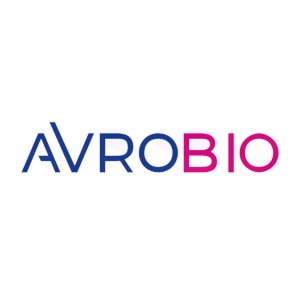AVROBIO Announces 100% Kidney Substrate Reduction at 12 Months Post-Gene Therapy in First Patient Dosed with plato® Gene Therapy Platform in Fabry Disease Phase 2 Trial
AVROBIO, Inc. (Nasdaq: AVRO), a leading clinical-stage gene therapy company with a mission to free people from a lifetime of genetic disease, today announced a
The company also announced six-month data from the first patient dosed in the Phase 1/2 trial of AVR-RD-02, an investigational ex vivo lentiviral gene therapy for Gaucher disease type 1, showing plasma chitotriosidase and the toxic metabolite lyso-Gb1 – key biomarkers of Gaucher disease – had both dropped sharply below the patient’s baseline levels achieved on enzyme replacement therapy (ERT) before gene therapy was administered. Additionally, all three cystinosis patients in the investigator-sponsored Phase 1/2 trialii of AVR-RD-04 show strong data across multiple measures and remain off cysteamine pills and eye drops, with trial enrollment completion expected this year.
“We are thrilled to begin the new year with this update, which adds to the breadth of strong clinical data we’ve reported across our leading lysosomal disorder pipeline of single-dose gene therapies,” said Geoff MacKay, president and CEO of AVROBIO. “With 13 patients dosed across three clinical programs, we have observed sustained and potentially transformative improvements in key biomarkers and functional metrics, with data from our Fabry disease program out 3 ½ years after dosing. Additionally, enrollment activities for our Fabry disease trial are accelerating, giving us added confidence in our efforts to meet our goal of having dosed a cumulative 30 patients across all our clinical programs by the end of the year. With this strong momentum, we look forward to clarifying the regulatory pathway with regulatory agencies.”
The data will be presented this week at the 17th annual WORLDSymposium™, an annual scientific meeting dedicated to lysosomal disorders, held virtually Feb. 8-12, 2021. The presentations and posters are available online for WORLD attendees on the conference website.
FAB-GT biopsy data:
Gb3 is a fatty substrate that accumulates in the cells of Fabry disease patients and can result in damage to multiple organs, including the kidneys, heart and CNS. The kidney biopsy for Patient 4 in the Phase 2 trial showed a reduction from an average of 4.0 globotriaosylceramide (Gb3) inclusions per peritubular capillary (PTC) at baseline to zero inclusions per PTC one year after dosing, a
Patient 4 is the first in the trial treated using AVROBIO’s proprietary plato® gene therapy platform, which includes a state-of-the-art lentiviral vector, a personalized conditioning regimen with precision dosing and an automated, closed manufacturing process intended to deliver potent and consistent drug product from manufacturing sites worldwide at commercial scale.
“The complete clearance of Gb3 substrate in kidney tissue, coming on top of strong results from the first evaluable kidney biopsy in this trial, is very exciting,” said Mark Thomas, M.D., the lead investigator in the FAB-GT trial, a clinician in the department of nephrology at Royal Perth Hospital and a clinical professor at the University of Western Australia Medical School. “Along with the reduction in plasma lyso-Gb3 observed across patients in this trial, which has been sustained up to 2.5 years so far, a massive drop in kidney substrate has the potential to substantially improve outcomes over ERT – the current standard of care. Fabry disease is a serious and life-shortening condition for many patients that requires lifelong fortnightly ERT infusions, with life-limiting symptoms manifesting throughout the body and brain, and we urgently need options to halt, prevent or reverse progression of the disease.”
Two of four FAB-GT trial participants had evaluable kidney biopsies. As previously reported, the kidney biopsy for Patient 1 showed an
Additional Fabry disease clinical data: Continued durability across multiple biomarkers and functional cardiac measurements
In addition to the kidney biopsy, AVROBIO reported updated data suggesting generally stable and sustained plasma and leukocyte alpha-galactosidase A (AGA) enzyme activity and a corresponding reduction in toxic plasma lyso-Gb3 in patients across the Phase 1 and FAB-GT trials of AVR-RD-01. To date, four patients have been dosed in the Phase 2 FAB-GT trial and five patients have been dosed in the fully enrolled Phase 1 trial.
New aggregated data across all cardiac measures for the FAB-GT patients show patients continue to exhibit stable cardiac structure and function at 12 months post-gene therapy, which is notable given that people living with Fabry disease often experience progressive left ventricular hypertrophy and fibrosis, leading to reduced cardiac function.
Additionally, the company is leveraging existing trial sites to potentially expand the pool of patients globally, with four Fabry disease patients from Brazil currently moving through the travel, screening, consent and enrollment process for potential treatment at AVROBIO’s global center of excellence in Australia.
No unexpected safety events have been identified in the AVR-RD-01 Phase 1 and Phase 2 trials as of the safety data cut-off date of Nov. 26, 2020 and Dec. 7, 2020, respectively. Eight serious adverse events (SAEs) reported in the two Fabry disease trials have been consistent with the conditioning regimen, stem cell mobilization, underlying disease or pre-existing conditions. All SAEs have been resolved without clinical sequelae.
Enrollment in the FAB-GT trial (NCT03454893) is ongoing, and further details are available on clinicaltrials.gov.
Gaucher disease type 1: Preliminary clinical data in first patient show improvement in relevant biomarkers, plasma chitotriosidase and lyso-Gb1, over patient’s ERT baseline
The first patient dosed in the Phase 1/2 Guard1 trial of AVR-RD-02 shows substantial improvement over pre-gene therapy ERT baseline in key biomarkers at six months post-gene therapy. This patient, who was previously ERT-stable, discontinued ERT use prior to gene therapy and remains off ERT. She was treated using AVROBIO’s proprietary plato® gene therapy platform.
The patient’s plasma chitotriosidase levels dropped
At six months post-gene therapy, the patient’s glucosylsphingosine (lyso-Gb1) metabolite levels were down
Hemoglobin and platelet counts, which are typically low in patients with Gaucher disease, remained in the normal range for the first patient at six months post-gene therapy.
“The early data from the first patient dosed with AVR-RD-02, our investigational gene therapy for Gaucher disease type 1, are consistent with what we have seen in our Fabry disease trials with lyso-Gb3,” said MacKay. “Based on the data observed to date, we believe lentiviral gene therapy drives down toxic metabolites below levels of ERT, supporting our view that gene therapy has the potential to prevent, halt or even reverse progression of these devastating diseases with a single infusion.”
No unexpected safety events have been identified in this first patient. There have been no SAEs related to AVR-RD-02 as of the safety data cut-off date of Jan. 4, 2021. Adverse events (AEs) reported have been consistent with the conditioning regimen, stem cell mobilization, underlying disease or pre-existing conditions.
Enrollment in the Phase 1/2 Guard1 trial (NCT04145037) is ongoing, and further details are available on clinicaltrials.gov.
Cystinosis: Continued positive data across multiple measures; all three patients remain cysteamine-independent post-gene therapy
All three cystinosis patients in the investigator-sponsored Phase 1/2 trial of AVR-RD-04 show strong data across multiple measures. Vector copy number (VCN/dg) data for all three patients continue to perform as expected. The first patient has potentially reached a VCN plateau, similar to the pattern seen in AVROBIO’s Fabry trials. The second patient had a VCN of 1.7/dg at six months and the third patient had a VCN of 2.6/dg at one month. All three patients remain off cysteamine pills and eye drops at 16, six and two months post-gene therapy respectively.
The renal function data for the first patient dosed in the trial, who has established, progressive kidney disease, suggest continued stabilization post-gene therapy. Additionally, imaging scans show a marked reduction in crystal density in both corneas, as well as a two-grade clinically meaningful improvement (from grade 3 to grade 1) in his photophobia, one of the more debilitating effects of cystinosis. Photophobia can be extremely painful for patients exposed to any level of light, requiring some patients to wear dark glasses all the time, even at night.
The investigator-sponsored Phase 1/2 trial (NCT03897361) of AVR-RD-04 is expected to be fully enrolled this year. Further details are available on clinicaltrials.gov.
No unexpected safety events have been identified in the trial, with no SAEs reported as of the Jan. 27, 2021, safety data cut-off date. AEs reported have been consistent with the conditioning regimen, stem cell mobilization, underlying disease or pre-existing conditions.
Investor and analyst presentation today at 8 a.m. ET
The conference call and presentation will begin at 8:00 a.m. ET and can be accessed under “Events and Presentations” in the Investors section of the company’s website at avrobio.com or by dialing (866) 353-0165 from locations in the U.S. and (409) 217-8080 from outside the U.S. The conference ID number is 3287052. An archived webcast recording of the event will be available on the website for approximately 30 days.
About AVROBIO
Our vision is to bring personalized gene therapy to the world. We aim to prevent, halt or reverse disease throughout the body with a single dose of gene therapy designed to drive durable expression of therapeutic protein, even in hard-to-reach tissues and organs including brain, muscle and bone. Our ex vivo lentiviral gene therapy pipeline includes clinical programs in Fabry disease, Gaucher disease type 1 and cystinosis, as well as preclinical programs in Hunter syndrome, Gaucher disease type 3 and Pompe disease. AVROBIO is powered by our industry leading plato® gene therapy platform, our foundation designed to deliver gene therapy worldwide. We are headquartered in Cambridge, Mass., with an office in Toronto, Ontario. For additional information, visit avrobio.com, and follow us on Twitter and LinkedIn.
Forward-Looking Statement
This press release contains forward-looking statements, including statements made pursuant to the safe harbor provisions of the Private Securities Litigation Reform Act of 1995. These statements may be identified by words and phrases such as “aims,” “anticipates,” “believes,” “could,” “designed to,” “estimates,” “expects,” “forecasts,” “goal,” “intends,” “may,” “plans,” “possible,” “potential,” “seeks,” “will,” and variations of these words and phrases or similar expressions that are intended to identify forward-looking statements. These forward-looking statements include, without limitation, statements regarding our business strategy for and the potential therapeutic benefits of our prospective product candidates, results of preclinical studies, the design, commencement, enrollment and timing of ongoing or planned clinical trials, clinical trial results, product approvals and regulatory pathways, the timing of patient recruitment and enrollment activities, and product approvals, anticipated benefits of our gene therapy platform including potential impact on our commercialization activities, timing and likelihood of success, and the expected benefits and results of our implementation of the plato® platform in our clinical trials and gene therapy programs, including the use of a personalized and ultra-precision busulfan conditioning regimen. Any such statements in this press release that are not statements of historical fact may be deemed to be forward-looking statements. Results in preclinical or early-stage clinical trials may not be indicative of results from later stage or larger scale clinical trials and do not ensure regulatory approval. You should not place undue reliance on these statements, or the scientific data presented.
Any forward-looking statements in this press release are based on AVROBIO’s current expectations, estimates and projections about our industry as well as management’s current beliefs and expectations of future events only as of today and are subject to a number of risks and uncertainties that could cause actual results to differ materially and adversely from those set forth in or implied by such forward-looking statements. These risks and uncertainties include, but are not limited to, the risk that any one or more of AVROBIO’s product candidates will not be successfully developed or commercialized, the risk of cessation or delay of any ongoing or planned clinical trials of AVROBIO or our collaborators, the risk that AVROBIO may not successfully recruit or enroll a sufficient number of patients for our clinical trials, the risk that AVROBIO may not realize the intended benefits of our gene therapy platform, including the features of our plato® platform, the risk that our product candidates or procedures in connection with the administration thereof will not have the safety or efficacy profile that we anticipate, the risk that prior results, such as signals of safety, activity or durability of effect, observed from preclinical or clinical trials, will not be replicated or will not continue in ongoing or future studies or trials involving AVROBIO’s product candidates, the risk that we will be unable to obtain and maintain regulatory approval for our product candidates, the risk that the size and growth potential of the market for our product candidates will not materialize as expected, risks associated with our dependence on third-party suppliers and manufacturers, risks regarding the accuracy of our estimates of expenses and future revenue, risks relating to our capital requirements and needs for additional financing, risks relating to clinical trial and business interruptions resulting from the COVID-19 outbreak or similar public health crises, including that such interruptions may materially delay our enrollment and development timelines and/or increase our development costs or that data collection efforts may be impaired or otherwise impacted by such crises, and risks relating to our ability to obtain and maintain intellectual property protection for our product candidates. For a discussion of these and other risks and uncertainties, and other important factors, any of which could cause AVROBIO’s actual results to differ materially and adversely from those contained in the forward-looking statements, see the section entitled “Risk Factors” in AVROBIO’s most recent Quarterly Report on Form 10-Q, as well as discussions of potential risks, uncertainties and other important factors in AVROBIO’s subsequent filings with the Securities and Exchange Commission. AVROBIO explicitly disclaims any obligation to update any forward-looking statements except to the extent required by law.
i Formerly known as the FAB-201 trial
ii Collaborator-sponsored Phase 1/2 clinical trial of AVR-RD-04 is funded in part by grants to UCSD from the California Institute for Regenerative Medicine (CIRM), Cystinosis Research Foundation (CRF) and National Institutes of Health (NIH).
View source version on businesswire.com: https://www.businesswire.com/news/home/20210208005145/en/









